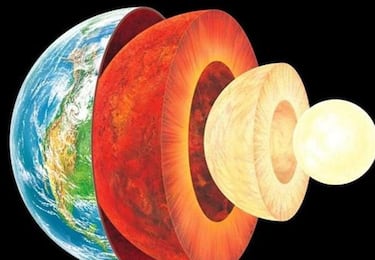What would happen if the Earth’s inner core starts spinning in the opposite direction?
The Earth’s core has stopped; Chinese scientists say that the direction of rotation has been reversed and the speed is decreasing.

Earth’s core comes to a standstill.
A study carried out by international scientists revealed that the deepest layer of our planet has slowed down, and even reversed the rotation of its spin.
The layers that surround the Earth’s core are positioned like an onion, in fact, phenomena such as earthquakes or eruptions are generated from its depths.
Researchers have reported over the years that the core rotates and is a well-known source of magnetism. According to National Geographic, the Aurora Borealis are produced by the activity of this event.
What is happening to the Earth’s core?
Yi Yang and Xiaodong Song, researchers at Peking University’s Institute of Theoretical and Applied Geophysics in China, recently published their latest study in the journal Nature Geoscience, where they reveal multiple theories about the geological shift of the Earth’s core. Their data and proposals, which have been circulated around the world, indicate the possibility that the speed of the rotation of the Earth’s core has stopped or slowed down.
What could be the consequences?
The Institute of Geosciences (IGEO) indicates that according to the most recent study, the Earth’s core would now be rotating in the opposite direction, “what the new research affirms is that the core its speed has decreased and it is ‘out of step’ with the speed of rotation of the rest of the planet. It is as if we, the crust, got ahead of the nucleus”, the report reads.

The researchers Yi Yang and Xiaodong Song, pointed out that their conclusion about the Earth’s core is based on a series of investigations. The team looked at multiple seismic waves that have been identified in previous years and through which its statistics determined that 200 earthquakes have taken place in northern Alaska and the southern Sandwich Islands. Using this data, they were then able to measure the speed of the waves and the impacts felt through the various layers under the earth’s core.
Are there consequences to the slowing down of the Earth's core?
Scientists from the Peking University Institute of Theoretical and Applied Geophysics point out that the findings are important to be aware of but that there will be no effect on the crust.
Related stories
The only possible consequence scientists have identified is that it could extend the amount of time it takes for Earth to rotate on its axis by 0.1 degrees per year. The scientific community has indicated that human beings will not feel the change in the core’s rotation. The most that could happen in the following years is that the day lengthens or, failing that, it shortens by a thousandth of a second compared to the last few years.
Did you know? Billions of years ago, days on Earth lasted approximately 23 hours, that’s right, according to the Institute of Geosciences (GEO), in the past, the planet rotated much faster than now.
